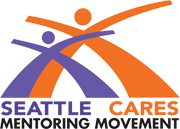Frequently Asked Questions
BECOMING A MENTOR
I want to become a mentor. How do I start?
Fill out an application packet found here on our website.
What kind of training do I receive?
Mentors attend an initial two-hour orientation session, held on the third Saturday every other month. The orientation sessions are offered online but we will soon be offering in-person training and orientation. Sign up here.
How much time do I have to give?
We ask you to commit four hours per month for one year.
Are the mentor assignments gender-specific?
Yes, we specifically recruit women to mentor girls while men mentor boys. Most of our mentees are in grades 6 to 12.
Do I have to be a parent to become a mentor?
Being a parent is not a requirement, being a caring community member is.
Is there an age limit?
Mentors must be 21 or older. Our mentors range from college students to great-grandparents.
MENTORING GOALS AND BENEFITS
What other support do you offer mentors?
We support our mentors through Community Wellness Circles, a weekly gender-specific meeting held in a safe and supportive environment. Wellness circles provide a place where mentors can speak honestly about their ups and downs, share tips and experiences with other mentors, ask questions, and learn from Seattle CARES staff on how to be more effective.
Mentors are also encouraged to attend our speaker presentations for ongoing education and training. Our series, Voices for Change, invites experts from around the country to present web-based workshops on topics ranging from mental health to improving family relationships. Our newest series InSight is held quarterly, providing tips and tools to deal with some of the most pressing challenges faced by our community.
As mentors, what are our goals?
We want to communicate to our youth that adults in their community value them and will help them succeed. We want to end academic and spiritual disengagement, violence and over-incarceration of our youth, which are crippling our community and our country. We want to improve literacy and increase the number of high school graduates among Black students, and we want to help Black youth enroll in a college, university or vocational training program to ensure a more successful future.
What do I get back in return?
Mentors report many benefits, both in their professional and personal lives. Some say mentoring increases self-confidence and self-esteem. Others see it as a way to do something positive and connect with their communities. Some choose mentoring because they had a mentor when they were young and they want to give back. Others want to take a pro-active role and have an impact on a young person’s life when it can really make a difference.
MORE ABOUT SEATTLE CARES
What is Seattle CARES?
Seattle CARES is part of a national nonprofit network focused on recruiting, training and engaging Black mentors. Our programs were developed by some of the nation’s top scholars, wellness professionals, educators and advocates who worked with our parent organization, National CARES Mentoring Movement. We were founded in 2008 and since then have received many King County and city grants as well as support from other nonprofits and foundations.
Tell me more about your programs.
Our innovative programs are research-driven, reflecting the needs and desires of our community. We seek out and listen to the voices of the students, young adults, parents and guardians we serve. We are guided by the latest research on race and opportunity, group mentoring, conflict resolution, diversity and more.
What organizations do you partner with?
We currently partner with Seattle Public Schools, City of Seattle, King County Best Start for Kids, 4C Coalition, Casey Family Programs, Marguerite Casey Foundation, Freedom Missionary Baptist Church, Churchome, Renton School District, and National CARES Mentoring Movement.

